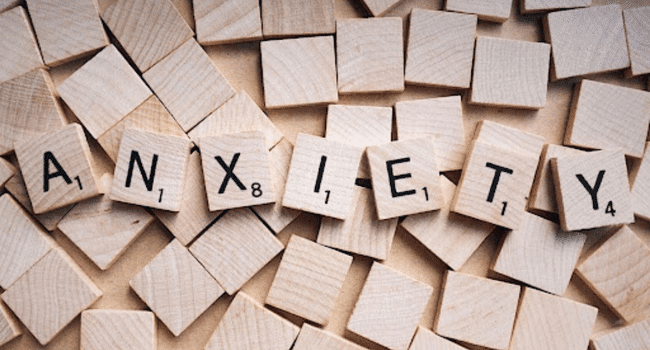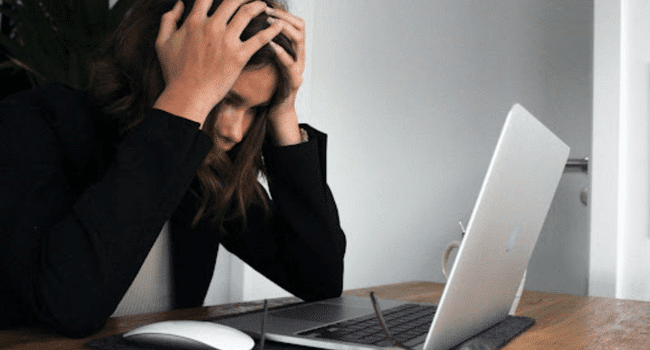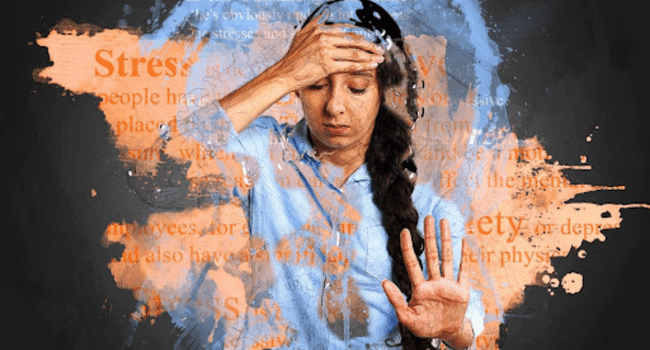Table of Contents
Anxiety is one of the most common types of emotional disorders among people and has a significant impact on their health and work lives. It is so common among people that it sometimes remains undetected because it is seen as normal.
However, anxiety can damage a person’s health, destroy relationships, hinder their social lives, cause substance abuse, and even lead to depression in the most severe of cases.
It has been estimated that 3.9 percent of the global population suffers from anxiety disorders, while 6.2% of the United States population lives with anxiety disorders.
Although almost every person must have felt anxiety in one way or another, especially when starting a brand-new job, moving to a rented apartment, meeting new people, and wondering whether or not they like you, etc. These concerns are normal; however, they should not get to the point where they interfere with your normal life; that is when they become a problem.
What is Anxiety?

Anxiety is a feeling of stress, worry, or anticipation about an event that is about to happen or is yet to occur. According to the American Psychological Association, anxiety is a tension-inducing sensation characterized by uneasy thoughts and worries leading to bodily changes like elevated blood pressure, excessive sweating, difficulty breathing, etc.
The term “anxiety” is frequently used interchangeably with the definition of “fear,” but they are not the same thing. Anxiety is expressed when a person is apprehensive about a future outcome or event, which sometimes leads to overthinking and nervousness about the outcome of the event.
It is normal to feel anxious about starting a new job, moving to a foreign city, or starting a new career. This feeling sometimes drives you to work harder to produce excellent results in your newly discovered field. However, it is considered an anxiety disorder when this feeling becomes extreme. This feeling causes the person to react in a tense way to situations and may even obstruct performing normal daily activities.
People with anxiety disorders tend to live in constant fear: fear of the unknown, fear of what is to come, and fear of uncertainty. Most anxiety disorders are exasperating and very common in times of uncertainty, such as an economic crisis, a recession, a disease outbreak, a pandemic, etc.
These disorders come in different forms and can affect both males and females. However, according to statistics, 7.67% of females in the US recorded anxiety disorders, compared to the 4.57% found in males.
Types of Anxiety disorders

Anxiety disorders take several forms and can be specific to different people. However, one thing that is common among all types of anxiety disorders is that they are emotional disorders. They are usually associated with a feeling of fear and uncertainty about an event or outcome.
Although most anxiety disorders are associated with a feeling of uncertainty about future action, some are health-related and can be either genetic or stem from a chronic disease or health condition.
Mental Health UK describes some of the common types of anxiety disorders, which include:
Social anxiety disorder: This is characterized by a fear of meeting people and socializing with others. It is highly common among people and has been recognized as one of the most common types of anxiety disorder. It has a 12% lifetime prevalence compared to other anxiety disorders.
People with an interpersonal anxiety disorder (also known as social phobia) tend to avoid social situations or feel tense during group gatherings or situations that involve socializing with people. These social situations could range from dating, speaking in public, eating in public, meeting with people, dancing in public, etc.
Generalized Anxiety Disorder: This tops the chart as the most common type of anxiety disorder. Generalized anxiety disorder (GAD) is characterized by intense fear or worry about almost everything. A person diagnosed with GAD is likely to have felt anxious most days for more than 6 months straight.
This type of anxiety disorder causes the person to worry about everything and is usually one of the most common causes of depression among people. A patient with GAD might find it challenging to maintain relationships, a job, or even leave the house for fear of uncertainty about the outcome.
Health anxiety disorder: This is characterized by a constant fear of being ill or having a disease. Patients who have a health anxiety disorder are always checking and examining themselves for signs of illness, even when they are not sick.
Also, they tend to always seek medical attention and do not always believe the reports they receive from doctors when they are not diagnosed with anything. As a result of their constant anticipation of an illness, patients with a health anxiety disorder tend to replicate the symptoms of terminal diseases even when they do not have them.
Phobias: This is an intense fear of an object, animal, thing, place, or feeling. A lot of people have different types of phobias, and it may lead them to consciously avoid interacting with those objects or places that will produce that feeling.
Phobias come in many forms, such as the fear of spiders, snakes, rats, and even pets like cats, dogs, etc. Or some may suffer from environmental factors, such as a fear of heights or contaminated environments.
Signs of an anxiety attack

It can be difficult to identify an anxiety attack in a person sometimes, but there are key symptoms to look out for. While some of these symptoms are mild, others can be severe, even leading to a complete meltdown.
An anxiety attack, however, is different from a panic attack, which is more abrupt and immediate. Anxiety attacks are usually mild and occur continuously, while panic attacks are severe and happen instantly.
Common signs of an anxiety attack include
- Sweaty palms
- Feeling uncomfortable
- Overthinking
- Dizziness
- Fast heartbeat
- Shortage of breath
- Headache
- Worry
How to Overcome Anxiety

Anxiety attacks can continue for a very long time, causing the person to feel anxious, uncomfortable, and nauseous. This anxiety stress can come from overthinking a project to deliver, a presentation, the thought of the sudden loss of a job, etc.
However, during these periods, it is best to develop and practice habits to get out of that zone and get your mind back on track. Some of the best-recommended methods to overcome anxiety include:
1. Identify your triggers and avoid them as much as possible.
Anxiety triggers are those things that could cause a person to become anxious or cause feelings of fear, worry, and nervousness. Every person has anxiety triggers, and it’s crucial to identify your triggers and avoid them as much as possible.
General anxiety symptoms can be clinically managed with the use of Nootropics such as Modafinil. The anxiolytic or anxiety-reducing effects of Modafinil were identified by Adrian Johnson and Trevor James Hamilton in a 2017 study that suggest that the administration of Modafinil decreased anxiety-like behavior in zebrafish across a range of doses. The anxiolytic activity of the Nootropic is scientifically explained to arise from its ability to lower reactivity to threatening stimuli in the amygdala region of the brain that controls anxiety.
You can now choose Healthmatter.co for Modafinil at an affordable price with free shipping.
Identifying anxiety triggers might be difficult to figure out on your own. Therefore, the most effective approach is to find a therapist to help you figure out your triggers. Getting a skilled therapist makes it easier to identify such triggers and provide solutions on how to avoid them.
2. Practice mindfulness meditation.
This is not a quick strategy, but practicing mindfulness meditation is a helpful way to ease the risk of anxiety over time. Although it takes a while to achieve, practicing mindfulness meditation helps you create positive habits that keep your mind relaxed and in tune with your body.
Some mindfulness meditations could be yoga, sitting still for a long time, or simply taking a walk regularly.
3. Take time out and meet friends.
It has been proven that one of the major causes of extreme anxiety and depression is loneliness. During times of uncertainty, where tensions are high, it is advisable not to think about the chaos of the moment. Instead, go out and have drinks with friends or enjoy the company of having friends around.
The sensations of laughter, relaxation, and fun conversations cause the brain to produce “happy hormones,” such as dopamine, serotonin, etc., which help to keep you in a positive, happy, and pleasurable mood.
4. Write down your thoughts.
This may sound cliché, but journaling down how you feel or what is running through your mind is one of the most effective ways to help reduce anxiety. That is because writing down your thoughts or journaling helps declutter your mind and releases the tension from thinking about so many details in your mind that produce excessive pressure.
According to the New York Times, journaling every day is necessary to keep your mind in top condition. In addition to helping you organize an event in your mind, it helps with coping with trauma.
5. Seek a professional
Anxiety is considered a mental health issue and should be given keen attention. If you notice signs of anxiety that are beginning to disrupt your day-to-day activities, it is advisable to seek professional help. Remember, you are not alone in this struggle.
Conclusion
In these uncertain times, it’s natural to feel anxious and overwhelmed, but by taking steps to manage your anxiety and seeking support when you need it, you can begin to feel more in control and better equipped to navigate the challenges ahead. Remember to be kind to yourself, practice self-compassion, and know that you are capable of overcoming anxiety and living a fulfilling life.
Read more on KulFiy
Back Pain Should Not Be Treated With Medication Initially
